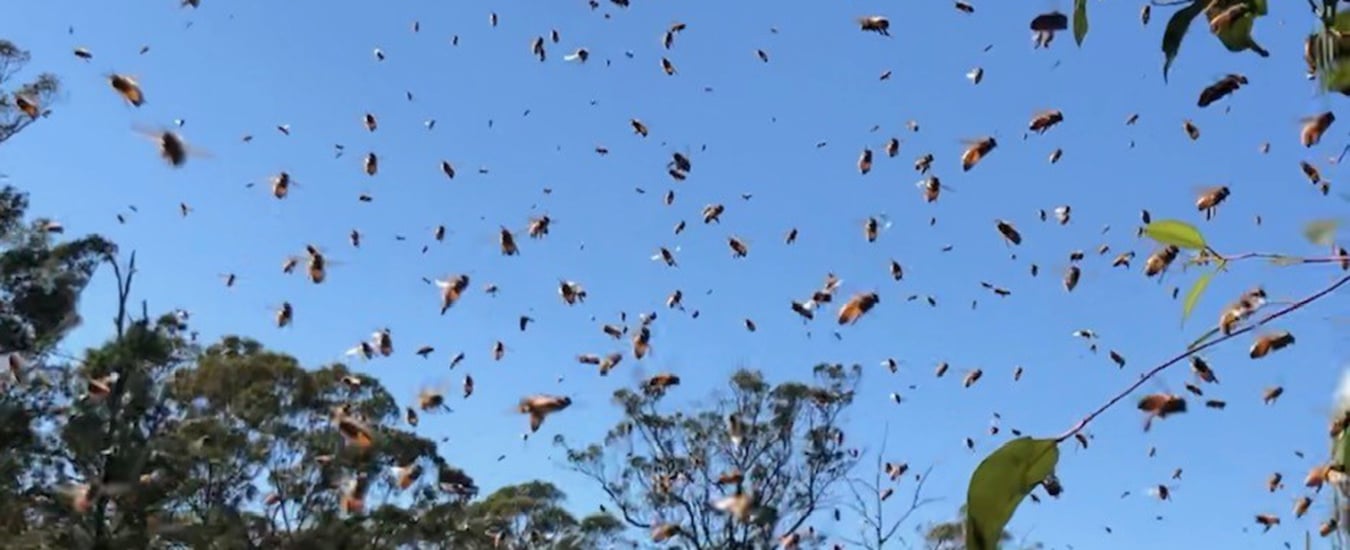With a growth in the keeping of bees especially in high residential areas, there are a few things to consider so that your bees do not become a problem for you, your family, friends and neighbours.
Remember not everyone loves bees, with some being scared, and a small percentage experiencing allergic reactions (anaphylaxis) that can be life threatening.
Don’t use bees as a weapon
Often neighbours who have been in disagreement for many years decide to place bees right on the boundary fence as revenge.
As an example a property owner had a right of way for the neighbour to access his property through hers. She decided the best place to locate her bees was alongside the property access easement that her neighbour used, disrupting his access. The property was 400 acres. Common sense would say that there were many better places on her property for her bees.
Requeen your hive

Image: Bees swarming courtesy of Mark Page, NSW DPI
Queen breeders don’t just breed queens to sell, they look at good traits from their breeder stock and a very important one is gentleness. A less aggressive queen passes this trait to her offspring and the hive as a whole will be less aggressive.
A gentleman called me for advice on his bees. While working them and for several days afterwards his wife, who loved to garden, could not go out as the bees would chase or sting her. She could not go within ten meters of the hive at other times. When asked about requeening the hive he said “I haven’t requeened since getting the hive 4 years earlier”.
Letting colonies requeen themselves may be natural to some, but this can also result in the bees losing the gentleness trait if the new queen mates with a lot of feral drones. The result can affect you, your family, friends and neighbours.
Reduce swarming activity
A swarm can be a scary thing for some.
Tens of thousands of bees swarming over the neighbour’s backyard or along the street can be quite upsetting. Minimise this by keeping a young queen at the helm and taking actions to reduce swarming. See Bee swarms and control factsheet
Pick your times to work your bees
What are the neighbours doing? If you see them preparing for a BBQ and friends rolling up and filling the backyard, pick another time. Bees can become aggressive after working a hive and a fence will not stop them.
Provide a clean water source
Bees use water to cool the hive on hot summer days, by providing a water source for them, hopefully they will stay away from the dogs’ water bowl, neighbour’s swimming pool and washing drying on the line.
There are many ideas for “providing water for bees” on YouTube.
Bright lights at night attract bees
Bright backyard lighting or lights above doorways can attract bees especially towards the end of summer, this can cause an issue if your bees are going to the neighbours’ lights. There is a possibility someone may be stung.
Position your hive so that the entrance is not directly in the path of bright lights or put up a blocking shield.
Avoid too many hives in the backyard
Just because they fit is not a reason to have multiple hives in your residential backyard. The size of your property should be considered:
Small high residential backyards or courtyards should be limited to 1-2 colonies.
Larger semi-rural 1-5 acre blocks may support more colonies, but remember not to let them become a nuisance.
Acknowledgements:
This article has been peer-reviewed by Nadine Chapman and Rod Bourke.


